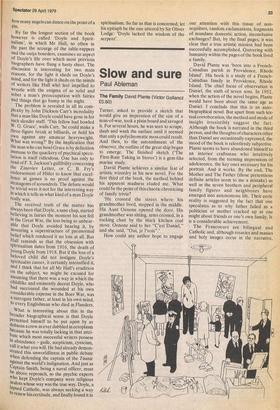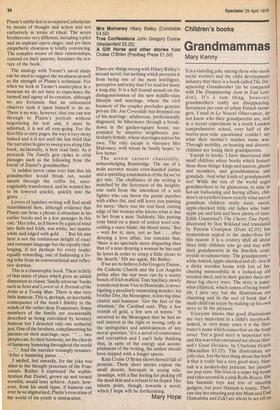Slow and sure
Paul Ableman
The Family David Plante (Victor Gollancz E5.60) Turner, asked to provide a sketch that would give an impression of the size of a man-of-war, took a plain board and savaged it. For several hours, he was seen to scrape, daub and wash the surface until it seemed that only a polychromatic mess could result. And then, to the astonishment of the observer, the outline of the great ship began to emerge. The finished sketch (`The First-Rate Taking in Stores') is a gem-like marine study.
David Plante achieves a similar feat of artistic wizardry in his new novel. For the first third of the book, the method behind his apparent madness eluded me. What could be the point of this chaotic chronicling of family trivia?
'He crossed the street where his grandmother lived, stopped in the middle. His Aunt Oenone opened the door. His grandmother was sitting, arms crossed, in a rocking chair by the black kitchen coal stove. Oenone said to her "C'est Daniel," and she said, "0 ui, je I'vois".'
How could any author hope to engage our attention with this tissue of nonsequiturs, random exclamations, fragments of mundane domestic action, inconclusive exchanges? But, by the final pages, it was clear that a true artistic mission had been successfully accomplished. Quivering with humanity within the pages of the book lived a family.
David Plante was 'born into a FrenchCanadian parish in Providence, Rhode Island'. His book is a study of a FrenchCanadian family in Providence, Rhode Island. The chief focus of observation is Daniel, the sixth of seven sons. In 1952, when the action of the novel begins, Plante would have been about the same age as Daniel. I conclude that this is an auto biographical novel. But apart from such tex tual corroboration, the method and mode of insight irresistibly suggest the fact.
Although the book is narrated in the third person, and the thoughts of characters other than Daniel are occasionally expressed, the mood of the book is relentlessly subjective.
Plante seems to have abandoned himself to an interior craftsman who intuitively selected, from the teeming impressions of adolescence, the key ones necessary for his portrait. And it works. By the end, The Mother and The Father (those pretentious definite articles seem to me a mistake) as well as the seven brothers and peripheral family figures and neighbours have emerged into autonomous life. Their eerie reality is suggested by the fact that one speculates as to why father failed as a politician or mother cracked up as one might about friends or one's own family. It is a considerable achievement.
The Francoeurs are bilingual and Catholic and, although rosaries and masses and holy images occur in the narrative, Plante's subtle feat is to express Catholicism by means of thought and action and not exclusively in terms of ritual. The seven brothers are very different, including a pilot and an aspirant opera singer, and yet their empathetic closeness is totally convincing. The complex weave of their relationships, centred on their parents, furnishes the texture of the book.
The analogy with Turner's naval study can be used to suggest the weakness as well as the strength of Plante's technique. For when we look at Turner's masterpiece in a museum we do not have to experience the turmoil and agony of its creation, although we are fortunate that an unlicenced observer took it upon himself to do so. There is no way, however, that one can win through to Plante's portrait without negotiating his text and, it must be admitted, it is not all easy-going. For the first fifty or sixty pages, the way is very stony indeed and it is not until the last third that the narrative begins to sweep you along (the book, incidentally, is best read fast). As it proceeds The Family gets riches in vivid passages such as the following from the burial of Daniel's grandmother: 'A sudden terror came over him that his grandmother would break out, would smash through the coffin lid, unrecognisably transformed, and he wanted her to be lowered quickly, quickly into the grave . .
Lovers of lapidary writing will find small nourishment here, although evidence that Plante can hone a phrase is abundant in his earlier books and in a few passages in this one: 'Her robe, as if blown by a gust of wind into furls and folds, was white, her mantle white and edged with gold. . .' But his aim here is not the continuous delight of exact and resonant language but the equally challenging, if not perhaps for every reader equally rewarding, one of fashioning a living tribe from its conversational and reflective detritus.
This is a claustrophic book. There is little of that sense of place which gives an added dimension to classic 'family universe' books such as Sons and Lovers or A Portrait of the Artist as a Young Man. There is also very little humour. This is, perhaps, an inevitable consequence of the work's fidelity to the minds of the rather dour Francoeurs. Some members of the family are occasionally described as being convulsed by lavatory humour but I detected only one authorial jest. One of the brothers, complimenting his parents on their marriage, says: ". . two people can, by their harmony, set the chords of harmony humming throughout the world . . .".' And the narrator teasingly resumes: 'After a humming pause . .
I smiled, but uneasily, for the joke was alien to the thought processes of the Francoeurs. Rather it expressed the sophistication that Daniel, grown up and turned novelist, would later achieve. Apart, however, from his small lapse, if humour can ever be so stigmatised, Plante's evocation of the world of his youth is immaculate. There are things wrong with Hilary Bailey's second novel; but nothing which prevents it from being one of the most intelligent, perceptive and witty that I've read for many a long day. It is a full frontal assault on the disingenuousness of the new middle-class lifestyle and marriage, where the civil business of the couples precludes genuine private life. Joe Coverdale has dropped out of his marriage: adulterous, professionally disgraced, he hibernates through a break down in the garden-square house, sur rounded by attentive neighbours, particularly female, whose marriages mirror his own. The only escape is visionary Mrs Mulvaney, with whom he finally hopes 'to live better.'
The action careers chaotically, acknowledging Bainbridge. The use of a male narrator means even-handed justice and a sparkling examination of the fix we've got into. The ebulliance of the writing is matched by the fierceness of the insights: one reels from the attentions of a real fighter who can throw the poetic punches with either fist, and still leave you panting for more: 'there was the real hard, cutting edge of the woman who knows what is due to her from a man. Suddenly, like putting your hand on a piece of cotton wool concealing a razor blade, the blood starts.' But — wait for it, men, not so fast . . . after denying a love affair, Joe remarks that, 'there is no spectacle more disgusting than that of a man denying a woman he has said he loves in order to creep a little closer to the hearth.' Hit me again, Ms Bailey.
If we are to believe John Gregory Dunne, the Catholic Church and the Los Angeles police after the war were run by a seamy bunch of Irish mafiOsi. Tom Spellacy, newly transferred from Vice to Homicide, is investigating a peculiarly nauseating murder: his brother Des, the Monsignor, is into big-time church and business: 'Get the feel of the situation,' the Cardinal said, 'Play a few rounds of gold, a few sets of tennis.' It occurred to the Monsignor that he had no real interest in the right or wrong, only in the ambiguities and ambivalences of any moral question.' It's a novel of connivance and corruption and I can't help thinking that, in spite of the energy and accomplishment of the writing, the author should have supped with a longer spoon.
Kate Cruise O'Brien shows herself full of promise. These short stories expose the small deceits, betrayals in young relationships, with a fine feeling for picking off the dead skin and a refusal to be duped. Her talents point, though, towards a novel, which I hope will be forthcoming.
Mary Hope



































 Previous page
Previous page